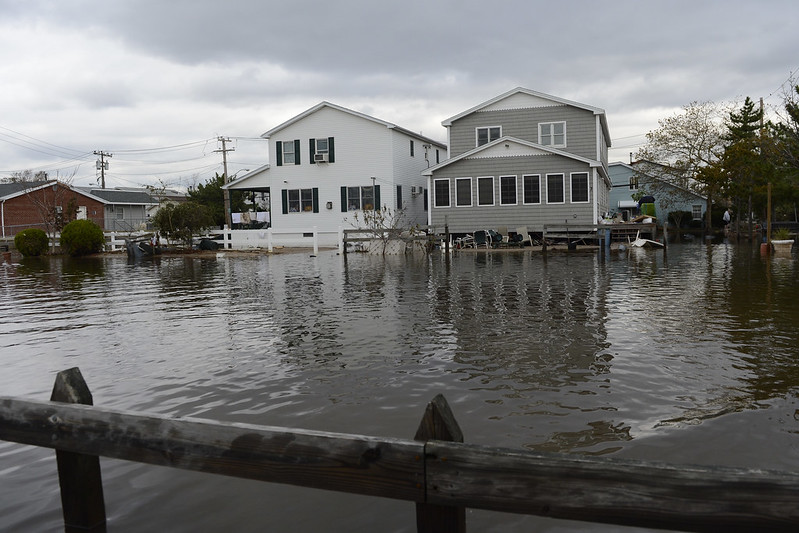
It's time to better prepare (photo: governor's office)
New York has faced its share of disasters, and each one seemed impossible and unprecedented until it actually happened. 9/11, Superstorm Sandy, and now COVID-19 each took a dramatic toll on our social and physical infrastructure, the state’s economy, and our very way of life.
We always recover, but we must break the cycle of rebuilding and plan for future risk instead. Any threats must be taken seriously as many communities are already overextended and strained. Hurricane season starts next month, and we need flood policy reforms at a federal level to ensure an already bad situation doesn't get worse.
The ongoing battle to contain COVID-19 coupled with the upcoming threat of hurricane season is a dangerous combination. Early forecasts indicate this Atlantic hurricane season may be worse than usual, which would have a devastating impact on our already fragile infrastructure. Flooding has massive and damaging impacts: from roads and public infrastructure to our homes to our workplaces. We saw this during Superstorm Sandy where New York’s infrastructure and economy took a massive hit. Sadly, our infrastructure is no better prepared now than it was then. When you factor in the consequences COVID-19 has already had on our state and sources of revenue, New York cannot handle another blow so soon.
Without comprehensive federal action to reduce flood risk, our current disaster relief and recovery policies will continue to allow and even incentivize risky development, leaving existing and future infrastructure and our communities in peril. As local businesses begin to reopen in a post-COVID world, we must ensure that they can remain open if a storm hits by investing in resilient infrastructure. Our small businesses rely on well-functioning infrastructure, and our community must advocate for an updated flood-ready requirement that is smart and forward-thinking. There are certain steps we and our policymakers must take that are critical to New York’s survival and recovery.
Support the 2020 Environmental Bond Act
First, we encourage New Yorkers to vote to approve the environmental bond act on the ballot for the general election this fall, which would be hugely advantageous for New York’s economy and environment. Despite facing challenges from COVID-19, Governor Cuomo and the Legislature advanced the bond act, known as the Restore Mother Nature Bond Act, which would provide $3 billion for a wide range of environmental protection programs and initiatives, including flood mitigation; habitat restoration; combating climate change; and clear water projects, while creating critical jobs.
Invest in Resilient Infrastructure
Our state’s economy is also directly tied to environmental resilience and sustainability. Every $1 invested in disaster mitigation saves $6 in flood damage costs. Our infrastructure across the state has trouble handling heavy rains, let alone massive storms, and in the current climate we must keep in mind that it is in our best economic interest to invest in a resilient foundation. By building or rebuilding with resilience in mind we can protect communities and save money.
Disclose a Property’s Flooding History
It is imperative to equip consumers with crucial information on properties they intend to buy or rent, like the property’s flooding history. If we make the disclosure of this information mandatory, people will be more prepared when making important and life-changing financial decisions, such as buying a house or renting an apartment, and therefore not be surprised by the massive financial upheaval that is caused if your living or working space is completely flooded. New Yorkers are having trouble making rent and mortgage payments now, and aren’t able to save up to fix property damage due to flooding.
Reform the NFIP
The National Flood Insurance Program (NFIP) is another key policy that helps protect our communities. However, it has not been updated to address locations that are flooding more frequently or are still handling damage from previous floods. The program remains $20 billion in debt. Congress must not only fund and reform the NFIP but invest in long-term resilience through FEMA’s Building Resilient Infrastructure and Communities program and the development of a revolving loan and grant program to fund risk reduction.
Through updates to NFIP, we can also promote and protect our existing ecological systems. Investing in nature-based solutions is crucial to encouraging flourishing wildlife while protecting our local communities.
All of these changes are economically smart and environmentally crucial, even more so as we begin to feel the aftershocks and recover from the total upheaval of COVID-19. We urge New York voters to approve the environmental bond act this fall and Congress to reform NFIP, protect our infrastructure and wildlife in New York, and provide a more stable economic pathway for the future.
***
Julie Tighe is President of the New York League of Conservation Voters, a nonpartisan, statewide environmental organization that fights for clean water, healthy air, renewable energy, and open space. On Twitter @JulieTighe17 & @NYLCV.
***
Have an op-ed idea or submission for Gotham Gazette? Email This email address is being protected from spambots. You need JavaScript enabled to view it.




